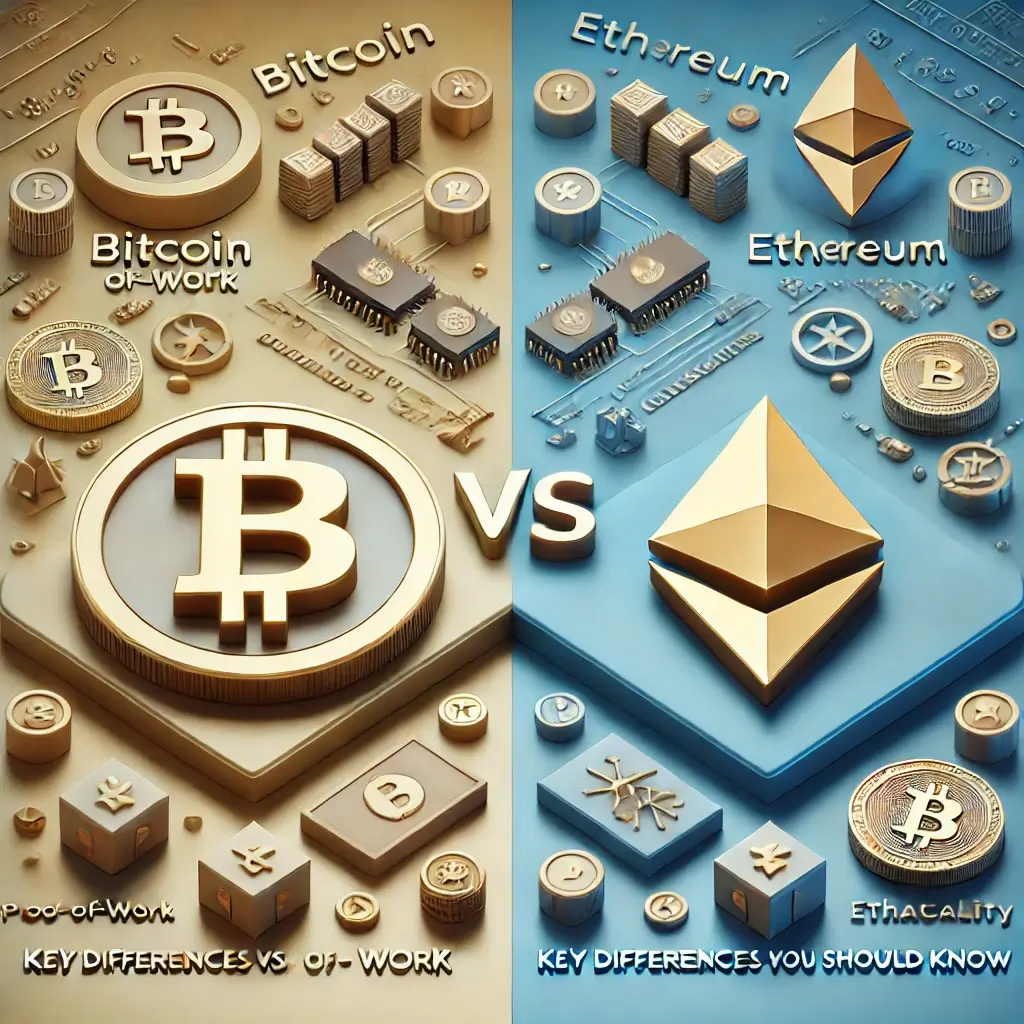Bitcoin vs. Ethereum: Key Differences You Should Know
1. Introduction to Bitcoin and Ethereum
Overview:
Bitcoin and Ethereum are the two most well-known cryptocurrencies, each representing a significant portion of the digital currency market. While both are based on blockchain technology, they were designed with different purposes in mind, leading to key differences in how they function and the roles they play in the cryptocurrency ecosystem.
Trade on Bybit:
Did you know you can trade both Bitcoin (BTC) and Ethereum (ETH) on Bybit? By using our special link, you can enjoy up to $30,000 in deposit bonuses, making it easier to start trading these leading cryptocurrencies.
2. Bitcoin: The Pioneer of Cryptocurrencies
Creation and Purpose:
Bitcoin was created in 2009 by an anonymous individual or group known as Satoshi Nakamoto. It was designed as a decentralized digital currency to enable peer-to-peer transactions without the need for intermediaries like banks. Bitcoin’s primary use case is as a store of value, often referred to as “digital gold.”
Key Features:
- Decentralization: Bitcoin operates on a fully decentralized network, meaning no central authority controls it. Transactions are verified by network nodes through cryptography.
- Supply Cap: Bitcoin has a fixed supply of 21 million coins, contributing to its scarcity and value proposition as a deflationary asset.
- Proof of Work (PoW): Bitcoin uses a consensus mechanism called Proof of Work (PoW), where miners compete to solve complex mathematical problems to validate transactions and secure the network.
- Security: Bitcoin is renowned for its security, having never been hacked since its inception. Its robust security model is one of its main selling points.
Why It Matters:
Bitcoin’s role as the first cryptocurrency has cemented its position as the most valuable and widely recognized digital asset. Its decentralized nature and limited supply make it a popular choice for investors looking to hedge against inflation and economic instability.
3. Ethereum: The World Computer
Creation and Purpose:
Ethereum was proposed in late 2013 by programmer Vitalik Buterin and went live in 2015. Unlike Bitcoin, which focuses primarily on being a digital currency, Ethereum is a decentralized platform that enables developers to build and deploy smart contracts and decentralized applications (DApps). It is often described as the “world computer.”
Key Features:
- Smart Contracts: Ethereum’s most significant innovation is its support for smart contracts—self-executing contracts with the terms of the agreement directly written into code. This allows for the creation of DApps that can operate autonomously on the blockchain.
- Ether (ETH): Ether is the native cryptocurrency of the Ethereum network, used to pay for transactions and computational services. Unlike Bitcoin, Ethereum does not have a fixed supply, but a recent update (EIP-1559) introduced a mechanism to burn a portion of transaction fees, reducing inflation.
- Proof of Stake (PoS): Ethereum is transitioning from Proof of Work to Proof of Stake (PoS), which is expected to reduce the network’s energy consumption significantly and improve scalability.
- Flexibility: Ethereum’s blockchain is more flexible than Bitcoin’s, allowing for a wide range of applications beyond simple transactions, including DeFi (Decentralized Finance) platforms, NFTs (Non-Fungible Tokens), and more.
Why It Matters:
Ethereum’s ability to support smart contracts and DApps has made it the foundation of the DeFi movement and the broader blockchain ecosystem. Its ongoing upgrades and the shift to PoS make it a key player in the future of decentralized technologies.

4. Key Differences Between Bitcoin and Ethereum
Purpose and Use Case:
- Bitcoin: Primarily a store of value and medium of exchange.
- Ethereum: A platform for decentralized applications and smart contracts.
Consensus Mechanism:
- Bitcoin: Uses Proof of Work (PoW), which is resource-intensive but highly secure.
- Ethereum: Currently transitioning from PoW to Proof of Stake (PoS), aiming for increased scalability and reduced environmental impact.
Supply and Inflation:
- Bitcoin: Fixed supply of 21 million coins, making it deflationary.
- Ethereum: No fixed supply, but mechanisms like EIP-1559 help control inflation by burning a portion of transaction fees.
Blockchain Flexibility:
- Bitcoin: Primarily used for simple transactions.
- Ethereum: Supports complex smart contracts and DApps, enabling a wide range of applications.
Network Upgrades:
- Bitcoin: Conservative approach to upgrades, focusing on security and stability.
- Ethereum: Actively undergoing major upgrades (e.g., Ethereum 2.0) to improve scalability, security, and sustainability.
5. Which Is Better: Bitcoin or Ethereum?
Investment Perspective:
- Bitcoin: Often seen as a “safe haven” asset, Bitcoin is considered a good store of value, particularly in times of economic uncertainty. Its fixed supply and established market presence make it a strong contender for long-term investment.
- Ethereum: Ethereum is more than just a currency; it’s a platform for innovation. Investors looking to capitalize on the growth of DeFi, NFTs, and other blockchain applications may find Ethereum to be a more dynamic investment.
Trading Opportunities on Bybit:
Both Bitcoin and Ethereum offer excellent trading opportunities. With Bybit, you can trade these cryptocurrencies with advanced tools and leverage options. Sign up on Bybit today using our special link to receive up to $30,000 in deposit bonuses and start trading like a pro.
Use Case Flexibility:
- Bitcoin: Best for those looking to invest in a digital store of value with a clear, established role in the market.
- Ethereum: Ideal for those interested in the broader blockchain ecosystem, including smart contracts, DApps, and innovative financial products.
Conclusion
Making an Informed Choice:
Whether you prefer the stability and simplicity of Bitcoin or the innovative potential of Ethereum, understanding the key differences between these two giants is crucial for making informed investment decisions. Both cryptocurrencies have their unique strengths and offer distinct opportunities in the rapidly evolving digital landscape.
For more insights and educational resources on cryptocurrency comparisons, visit our Cryptocurrency Comparisons Guides.
Stay Updated
For the latest updates on Bitcoin, Ethereum, and other cryptocurrency comparisons, follow us on:
Stay informed with the latest strategies and insights in the world of cryptocurrency at FreeCoins24.io.
Special Offer
Want to start trading Bitcoin and Ethereum? Sign up on Bybit today and take advantage of up to $30,000 in deposit bonuses. Don’t miss out on the chance to trade these leading cryptocurrencies on one of the best platforms available.

















